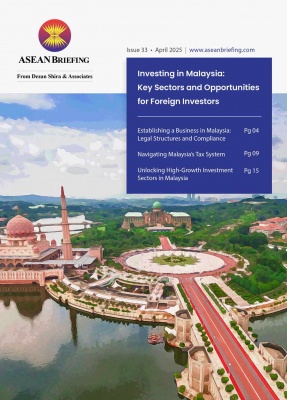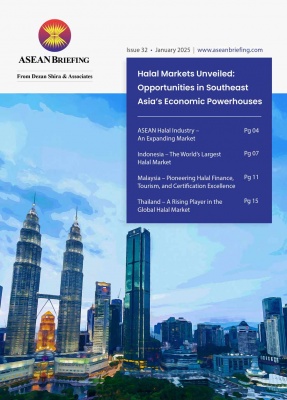Vietnam’s 2024 Social Insurance Law: Implications for Businesses
Vietnam's revised 2024 Social Insurance Law, effective from July 1, 2025, includes new amendments aimed at enhancing social insurance coverage and adequacy in the country. These amendments seek to adopt international standards and secure the future of the country’s rapidly aging population.
Vietnam's 15th National Assembly (NA) passed Law 41/2024/QH15 on Social Insurance (SI) during its seventh sitting at the end of June 2024, with 93.42 percent of the deputies voting in favor. Before its passage, the new law had received consensus from the government and relevant agencies.
The new law's enforcement will lead to the annulment of Law No. 58/2014/QH13 on SI and Resolution No. 93/2015/QH13 on implementing the one-time SI policy for employees.
Objectives of Vietnam's 2024 Social Insurance Law
The 2024 Social Insurance Law regulates the rights and obligations of competent authorities, organizations, and individuals toward:
- The implementation of SI;
- Social pension benefits;
- Registration and management of SI collection and payment;
- Regimes and policies for both compulsory and voluntary SI;
- Social Insurance Fund;
- Supplementary pension insurance;
- Complaints, denunciations, and handling of SI violations; and
- State management of SI.
The new law introduces amendments that address current inadequacies between legislation and real-life practice, while expanding rights and benefits for SI participants.
Among its various goals, the new law aims to better ensure SI rights for Vietnamese workers abroad and foreign workers in Vietnam. A notable effort is the introduction of more attractive rights to encourage participants to reserve their contributions in SI to enjoy pensions instead of opting for one-time SI payments.
Key changes in the 2024 Social Insurance Law
The draft bill has been amended and supplemented with 11 chapters comprising 141 articles, presenting nine key legal changes:
- State-ensured social pension: The law stipulates that the social pension is partly ensured by the State, building on existing regulations for monthly social subsidies for the elderly.
- Interconnection in SI system: It introduces a monthly subsidy for the period before reaching the age for social pension allowance, during which the State provides healthcare insurance.
- Expanded mandatory SI coverage: The law expands the mandatory social insurance coverage.
- Increased benefits for SI participants: Benefits include reduced minimum years of SI contributions required to receive monthly pensions and maternity benefits for voluntary SI participants.
- Separate chapter for SI premium collection and contribution: This chapter regulates the collection and contribution of SI premiums, clarifying the handling of delayed and evaded contributions.
- New “reference level” for calculations: The law replaces the “statutory pay rate” or “base salary” with a “reference level,” a government-prescribed monetary amount for calculating SI premiums and benefits.
- Specific regulations on SI fund investment and management: It provides more specific regulations on the investment and management of the SI fund, including the approval and appraisal of organizational expenditure and SI operations.
- Simplified administrative procedures: The law simplifies administrative procedures related to SI, electronic transactions, and assesses people's satisfaction with the implementation of SI policies and regimes.
Impactful amendments under the new law and updated compliance obligations
The new law introduces significant changes to the implementation and management of social insurance, requiring businesses to make meaningful adjustments to comply with it.
Compulsory SI subjects
Clause 1, Article 2 of the new law adds several subjects covered by compulsory SI, compared to the current law. Employers should note the inclusion of:
- Controllers, representatives of state capital, and representatives of enterprise capital who receive salaries.
- Employees who sign a part-time labor contract of one month or more, with a monthly salary equal to or higher than the salary level used as a basis for the minimum compulsory SI payment.
- Enterprise managers, controllers, state capital representatives, and enterprise capital representatives who do not receive salaries.
The new Social Insurance Law explicitly addresses scenarios and conditions for part-time job participation in mandatory social insurance. The previous law lacked specificity in this area, leading to ambiguity. Under the new law, if an employee's monthly income from a part-time job meets or exceeds the minimum regional wage, they are required to participate in mandatory social insurance for that month. Organizations that employ a large part-time workforce and do not currently budget for social insurance and trade union fees should carefully plan their budgets for the upcoming year to accommodate these new obligations. - Nguyen Vu Phuoc Hong, Manager of HR and Payroll at Dezan Shira & Associates Vietnam
Non-compulsory SI subjects
Article 2 of the new Social Insurance Law introduces specific cases where SI payments are not required.
For foreign employees working in Vietnam, the law now mandates participation in mandatory social insurance if they have a labor contract lasting at least 12 months, regardless of whether they hold a work permit, a work permit exemption, or another type of permit.
Under the former law, foreign employees were required to participate in mandatory social insurance only if they had a labor contract of at least 12 months and possessed work permits, practice certificates, or practice licenses issued by competent Vietnamese authorities.
The new law also outlines scenarios where foreign employees are exempt from statutory SI contributions:
- Internal transfers within the enterprise, as stipulated by the law governing foreign employees in Vietnam.
- Foreign employees who have reached the retirement age at the time of signing the labor contract, as specified in Clause 2, Article 169 of the Labor Code.
- Cases where international treaties to which Vietnam is a signatory have different provisions.
Under the former Social Insurance Law, the requirement to participate in mandatory social insurance was tied to specific types and durations of labor contracts, without explicitly addressing the nature of the labor relationship. The new Social Insurance Law, however, provides clear and specific provisions regarding the subjects covered by compulsory social insurance, focusing on the nature of the work. As long as the relationship between the parties involves labor ties, participation in mandatory social insurance is required—regardless of the terminology used for the contract. This includes contracts labeled as service contracts, freelancing contracts, or similar terms. - Nguyen Vu Phuoc Hong, Manager of HR and Payroll at Dezan Shira & Associates Vietnam
Periodic posting of SI payment information
The new law eliminates the following requirements from Clause 7 and 8, Article 21 of the current law:
- Posting information on the payment of SI premiums for employees every six months.
- Providing information on employees’ payment of SI premiums at the request of employees or trade union organizations every six months.
- Annually posting information on employees’ payment of SI premiums provided by SI agencies under Clause 7, Article 23 of the current law.
Base money amount for compulsory SI payment
Point dd, Clause 1, Article 31 of the new law stipulates, at the time of payment, the salary used as a basis for paying compulsory SI must:
- be at least equal to the regional wage plus 7 percent for the trained job; and
- not exceed 20 times the reference level (also called: statutory pay rate”).
Definition of the "Reference Level" (Article 7):
- The reference level is the amount determined by the government for calculating payment and benefit levels for certain SI benefits.
- It is adjusted based on the increase in the consumer price index (CPI) and economic growth, considering the state budget's capacity and the SI fund.
SI payment rates for non-salaried positions
The current law does not specify the SI payment rates for non-salaried positions, such as business manager, representative of state capital portion, representative of enterprise capital portion, member of the board of directors, general director, director, member of the board of supervisors or controller, etc.
However, according to Clause 4, Article 33 of the Law on Social Insurance 2024, the monthly SI payment for these subjects will be set as follows:
- For the sickness and maternity fund, 3 percent of the monthly income on which SI premiums are based; and
- For the retirement and death insurance fund, 22 percent of the monthly income on which SI premiums are based.
Compulsory SI payment for extended sick leave period
A new provision in Clause 6, Article 33 of the 2024 Social Insurance Law stipulates the following regarding SI payment during extended sick leave:
- SI payment is required if an employee takes sick leave for 14 working days or more during their first work month or the first month of returning to work.
- If an employee takes sick leave for 14 working days or more at any other time, they are not required to pay SI for that month, unless there is an agreement between the employer and the employee to continue SI payments for that month, based on the same basis as the most recent month.
Changes in late payment and payment evasion
While the existing law does not contain official definitions of late payment and payment evasion for SI and unemployment insurance (UI), Articles 38 and 39 of the new law clearly identify the differences between them.
There is also a change in interest rates in these cases.
|
Existing law |
2024 Law on Social Insurance |
|
Per Clause 3, Article 122, if employers are late in payment, evading payment, or misappropriating SI contributions for 30 days or more, they are subject to:
If they fail to do so, then at the request of competent personnel, related banks, credit institutions, or state treasuries shall deduct money from the employer’s deposit accounts to the accounts of social insurance agencies to pay the unpaid or late payment and interest. |
Per Clause 1 of both Articles 40 and 41, measures to handle late payments, payment evasion of compulsory SI or UI will be as follows:
|
Shortened time period to issue the first compulsory SI book
Clause 4, Article 28 of the new law stipulates that the time for issuing the first compulsory social insurance book is reduced to five working days from the receipt of a complete application, down from the 20-day mandate of the current law.
If the social insurance book is not issued within this period, a written response must be provided explaining the reason for the delay.
A common question on salary base for SI contribution
A common question has emerged regarding the calculation of Social Insurance (SI) contributions under Vietnam's new Social Insurance Law: Should companies base their calculations on the employee's base salary or their actual take-home salary?
Explanation from Dezan Shira & Associates:
Under the new Social Insurance Law, the basis for calculating SI contributions is the salary, including the basic salary and certain allowances as prescribed by law—not the actual take-home salary.
Key points:
- According to Clause 1, Article 31 of the new law, the salary used for compulsory social insurance contributions includes:
- The monthly salary as determined by the employer, which covers the job or position-related salary, salary allowances, and other additional amounts that are agreed upon and paid regularly and stably in each salary payment period.
- If the monthly salary (as specified in Clause 1 or 2) exceeds 20 times the statutory pay rate, the salary used for SI contributions is capped at 20 times the statutory pay rate.
Comparison of salary components:
The basic salary, allowances, and actual take-home salary may differ based on how the salary structure is set up. If the salary structure allocates more to components other than the basic salary, the actual take-home salary might be higher. However, this is a hypothetical scenario, as Vietnamese law does not apply it in practice.
When multiple options exist for calculating the SI contribution, authorities may consider the total income before deductions for the employee's mandatory SI contribution and personal income tax. This total income often results in a higher contribution base than the actual take-home salary.
Conclusion
The 2024 Social Insurance Law aims to enhance the coverage and adequacy of social insurance in Vietnam, ensuring SI rights for both Vietnamese workers abroad and foreign workers in Vietnam.
Businesses should carefully review the new law and stay informed about future government directives to ensure compliance and avoid evasion, as the law will come into effect on July 1, 2025.
For organizations that have a huge part-time workforce and currently no budget for social insurance, the trade union fee should be considered for the planning budget for the following year.
This article was originally published on July 31, 2024. It was last updated on August 9, 2024.
This article first appeared on Vietnam Briefing, our sister platform.
About Us
ASEAN Briefing is produced by Dezan Shira & Associates. The firm assists foreign investors throughout Asia and maintains offices throughout ASEAN, including in Singapore, Hanoi, Ho Chi Minh City, and Da Nang in Vietnam, in addition to Jakarta, in Indonesia. We also have partner firms in Malaysia, the Philippines, and Thailand as well as our practices in China and India. Please contact us at asean@dezshira.com or visit our website at www.dezshira.com.



















